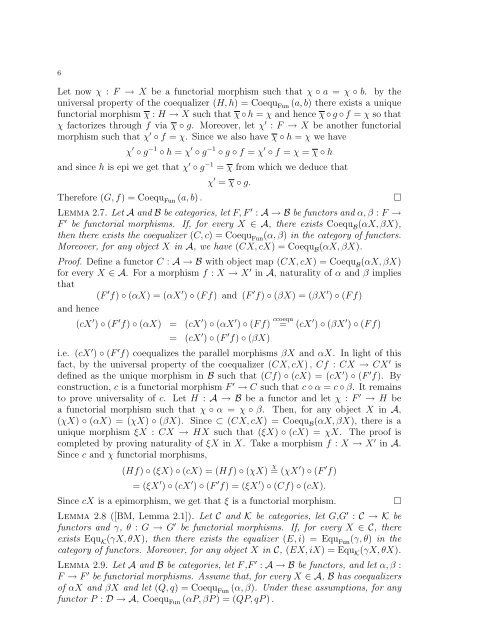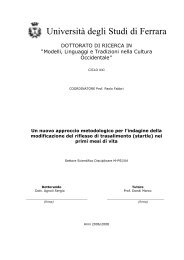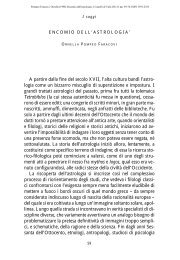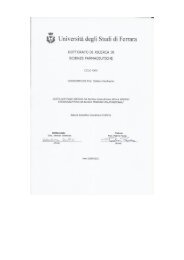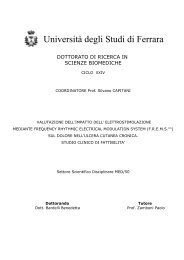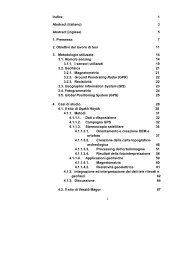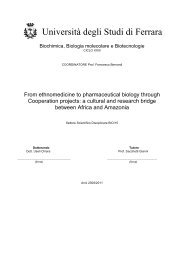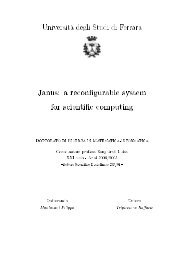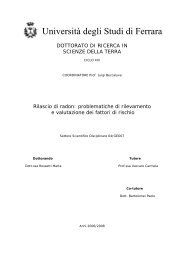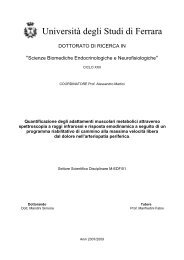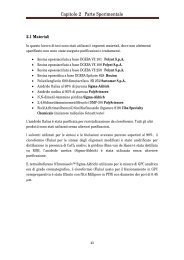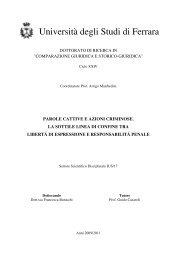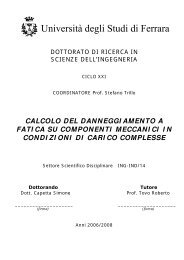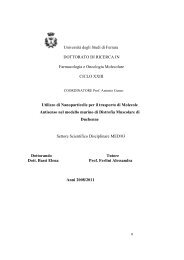Contents 1. Introduction 2 2. Preliminaries 4 2.1. Some results on ...
Contents 1. Introduction 2 2. Preliminaries 4 2.1. Some results on ...
Contents 1. Introduction 2 2. Preliminaries 4 2.1. Some results on ...
You also want an ePaper? Increase the reach of your titles
YUMPU automatically turns print PDFs into web optimized ePapers that Google loves.
6Let now χ : F → X be a functorial morphism such that χ ◦ a = χ ◦ b. by theuniversal property of the coequalizer (H, h) = Coequ Fun (a, b) there exists a uniquefunctorial morphism χ : H → X such that χ ◦ h = χ and hence χ ◦ g ◦ f = χ so thatχ factorizes through f via χ ◦ g. Moreover, let χ ′ : F → X be another functorialmorphism such that χ ′ ◦ f = χ. Since we also have χ ◦ h = χ we haveχ ′ ◦ g −1 ◦ h = χ ′ ◦ g −1 ◦ g ◦ f = χ ′ ◦ f = χ = χ ◦ hand since h is epi we get that χ ′ ◦ g −1 = χ from which we deduce thatTherefore (G, f) = Coequ Fun (a, b) .χ ′ = χ ◦ g.Lemma <str<strong>on</strong>g>2.</str<strong>on</strong>g>7. Let A and B be categories, let F, F ′ : A → B be functors and α, β : F →F ′ be functorial morphisms. If, for every X ∈ A, there exists Coequ B (αX, βX),then there exists the coequalizer (C, c) = Coequ Fun (α, β) in the category of functors.Moreover, for any object X in A, we have (CX, cX) = Coequ B (αX, βX).Proof. Define a functor C : A → B with object map (CX, cX) = Coequ B (αX, βX)for every X ∈ A. For a morphism f : X → X ′ in A, naturality of α and β impliesthat(F ′ f) ◦ (αX) = (αX ′ ) ◦ (F f) and (F ′ f) ◦ (βX) = (βX ′ ) ◦ (F f)and hence(cX ′ ) ◦ (F ′ f) ◦ (αX) = (cX ′ ) ◦ (αX ′ ) ◦ (F f) ccoequ= (cX ′ ) ◦ (βX ′ ) ◦ (F f)= (cX ′ ) ◦ (F ′ f) ◦ (βX)i.e. (cX ′ ) ◦ (F ′ f) coequalizes the parallel morphisms βX and αX. In light of thisfact, by the universal property of the coequalizer (CX, cX) , Cf : CX → CX ′ isdefined as the unique morphism in B such that (Cf) ◦ (cX) = (cX ′ ) ◦ (F ′ f). Byc<strong>on</strong>structi<strong>on</strong>, c is a functorial morphism F ′ → C such that c ◦ α = c ◦ β. It remainsto prove universality of c. Let H : A → B be a functor and let χ : F ′ → H bea functorial morphism such that χ ◦ α = χ ◦ β. Then, for any object X in A,(χX) ◦ (αX) = (χX) ◦ (βX). Since ⊂ (CX, cX) = Coequ B (αX, βX), there is aunique morphism ξX : CX → HX such that (ξX) ◦ (cX) = χX. The proof iscompleted by proving naturality of ξX in X. Take a morphism f : X → X ′ in A.Since c and χ functorial morphisms,(Hf) ◦ (ξX) ◦ (cX) = (Hf) ◦ (χX) χ = (χX ′ ) ◦ (F ′ f)= (ξX ′ ) ◦ (cX ′ ) ◦ (F ′ f) = (ξX ′ ) ◦ (Cf) ◦ (cX).Since cX is a epimorphism, we get that ξ is a functorial morphism.Lemma <str<strong>on</strong>g>2.</str<strong>on</strong>g>8 ([BM, Lemma <str<strong>on</strong>g>2.</str<strong>on</strong>g>1]). Let C and K be categories, let G,G ′ : C → K befunctors and γ, θ : G → G ′ be functorial morphisms. If, for every X ∈ C, thereexists Equ K (γX, θX), then there exists the equalizer (E, i) = Equ Fun (γ, θ) in thecategory of functors. Moreover, for any object X in C, (EX, iX) = Equ K (γX, θX).Lemma <str<strong>on</strong>g>2.</str<strong>on</strong>g>9. Let A and B be categories, let F ,F ′ : A → B be functors, and let α, β :F → F ′ be functorial morphisms. Assume that, for every X ∈ A, B has coequalizersof αX and βX and let (Q, q) = Coequ Fun (α, β). Under these assumpti<strong>on</strong>s, for anyfunctor P : D → A, Coequ Fun (αP, βP ) = (QP, qP ) .□□


